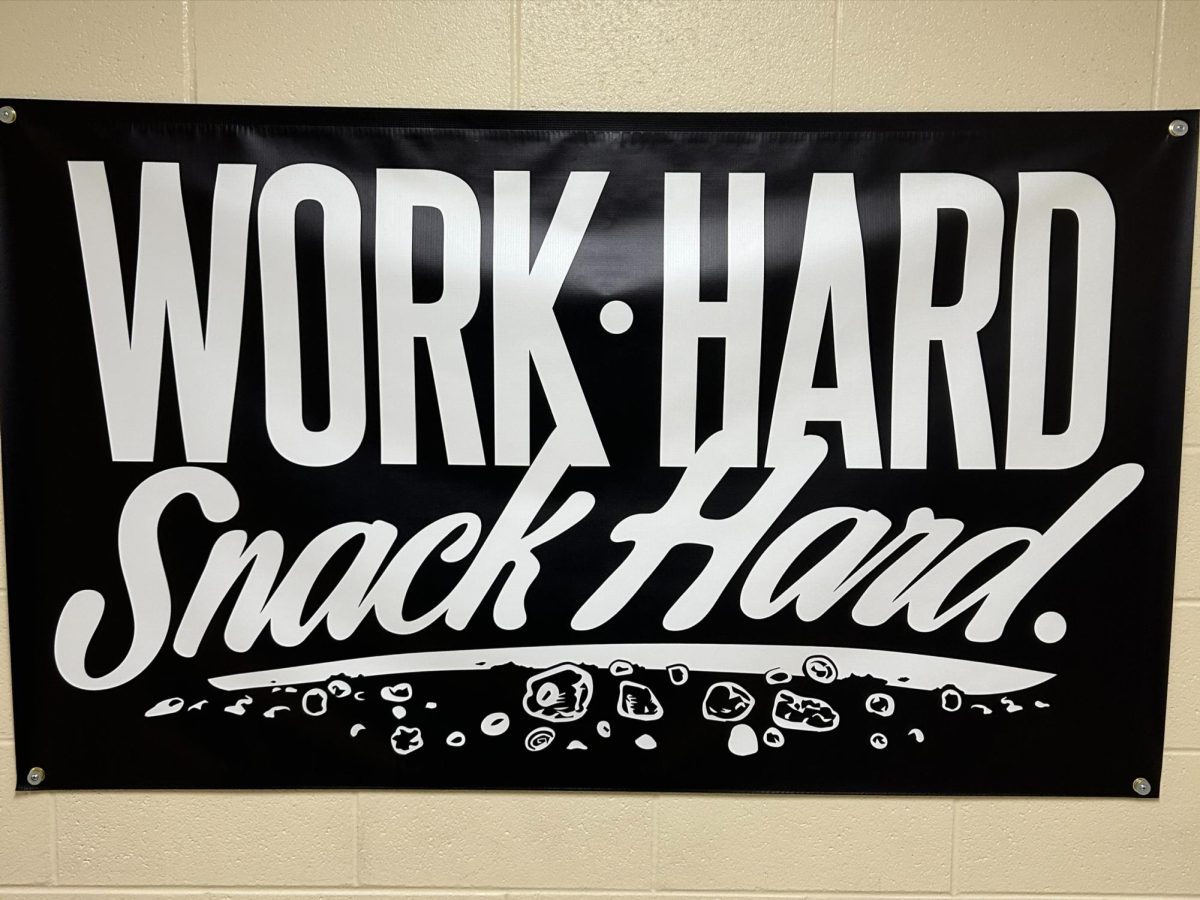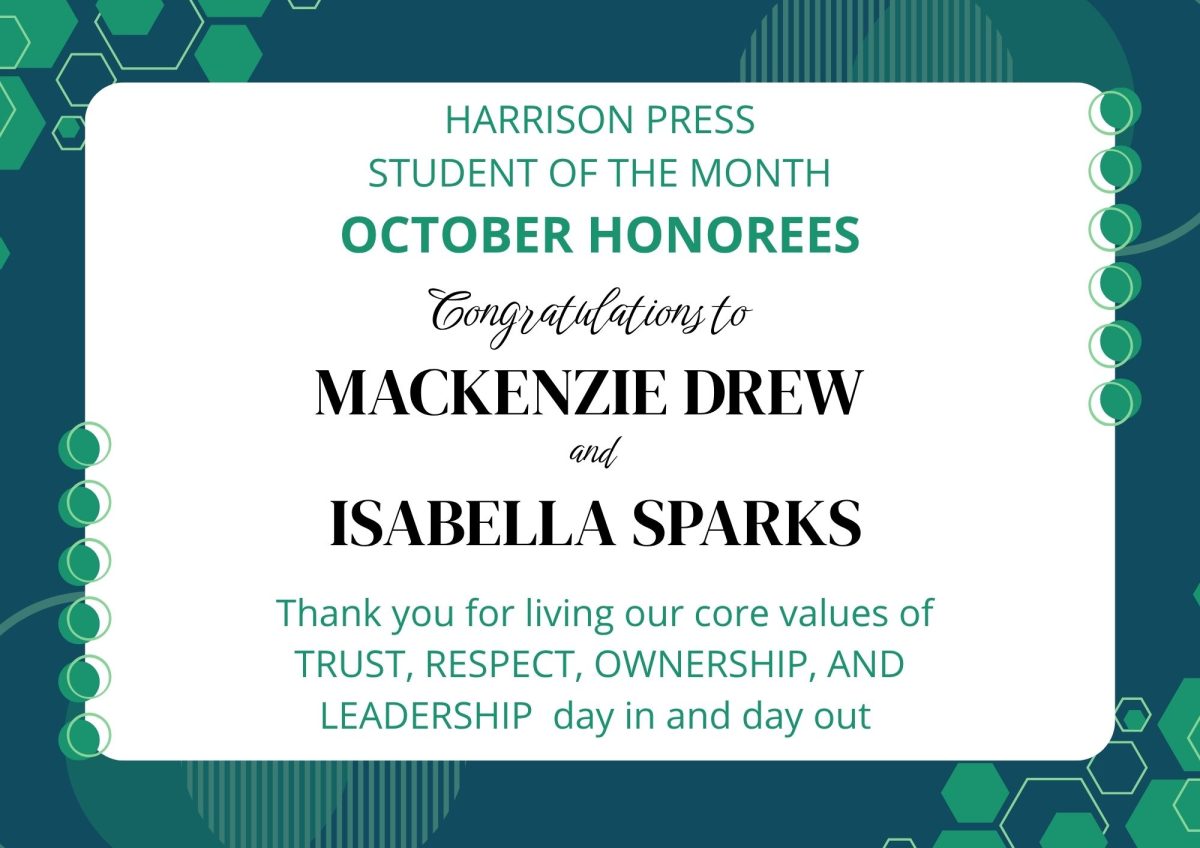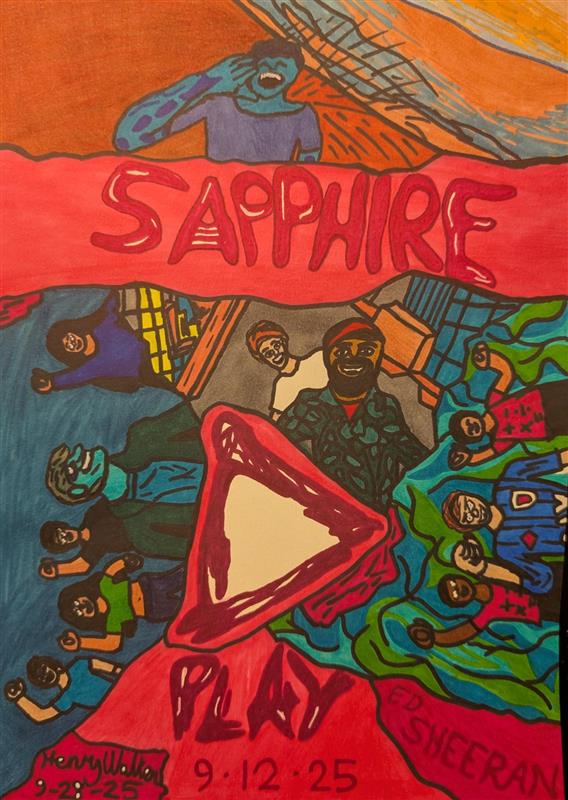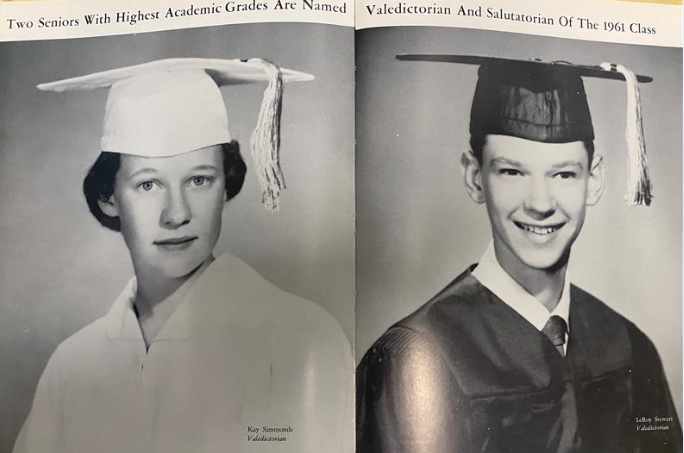This article expresses two points of view on the issue of using the Valedictorian system, they have been listed in alphabetical order by the author’s last name.
For Val/Sal by: Paige Burnett
Students at Harrison could be saying goodbye to valedictorians for good, not just at the commencement ceremony. This would hurt students because it would demotivate excellence at the top level.
The valedictorian is the student in a graduating class with the highest overall grade point average (GPA). GPA, which typically takes into account both the difficulty of classes taken and the grade received in said classes, is the most universal tool used by both high schools and colleges alike to determine overall academic achievement, making it a sensible option for determining the student most worthy of special honors at the commencement ceremony.
More than just honoring the top ranked student of a graduating class, class rankings allow for a wider array of students to be honored for their academic achievements. At Harrison, the practice of honoring the Top 20 juniors and letting them out of school two weeks early is also a special opportunity that motivates students to pursue academic excellence. According to Emma Huffman, a top 20 junior in the 2022/23 school year and current Senior ranked 18th in her class, “I think that being in the top 20 has motivated me to want to be better in rank, however I would have worked just as hard either way. Top 20 is a good way to recognize the people that are working hard and motivate them to keep their grades up. Harrison should keep this practice.”
Fellow Senior Chloe Schwettmann, another member of the top 20 ranked 14th in her class, agreed with Huffman, stating “I am 14th, but I have never been very motivated by my rank. It is nice to get the recognition for my rank, but I’ve never stressed myself out over the fact that I needed to move up the rank. However, I would understand if someone in the valedictorian range or in the low 20s feels a lot of pressure to reach the next level.”
This idea was echoed by current Salutatorian for the class of 2024, Leah Marx, who stated “Yes, I am passionate about being valedictorian, but it wouldn’t destroy my world if I didn’t get it. I think the ranking system is a motivating factor for me because I’ve been either 1st, 2nd, or 3rd all four years, so it has been in my grasp. I think the Latin honors system makes sense, and the high honors system is great, however I think it’s important to specifically acknowledge at least the top three students.”
This shows how current Harrison students, especially the students most affected by this system, feel that, to some extent, it has motivated them to succeed in their education. The current valedictorian for the class of 2025, Matthew Rudolph, explained that “I would personally still work hard for my classes even if it wasn’t for class rank, but the class rank causes me to go the extra step and study the extra hour.” The competitive aspect of the class ranking system has a significant benefit, as students are pushed to do their absolute best academically.
While the competitive aspect has been criticized for potential negative effects, such as harming student relations or causing unsportsmanlike behavior, Schwettmann believes that “I have never seen or heard anyone from our school doing such things, so I wouldn’t consider class rank to be a huge problem at Harrison.”
Harrison students excel at representing our core values; the competition for class rank has always maintained a lighthearted atmosphere. Harrison students push each other to improve, not purposefully harm other students for their own gain. While other schools might face issues with class rank, Harrison’s uniquely convivial student body creates the perfect atmosphere for the ranking system to stay in use.
Additionally, students in the top of their class acknowledge that it is a beneficial honor, but understand that they would work just as hard regardless of the honor they receive. This shows that while the competitive aspect of this system has some benefit, these students mainly want to be recognized for their successes. Students at the top of their class work hard to be there, and it would be unfair to deny them the honors associated with a high class rank. Most students eagerly await their graduation day for most of their educational careers, and this is even more true for valedictorians and salutatorians. When they have been dreaming of this honor for years, it would be cruel to get rid of this practice for upcoming graduating classes. Even if Harrison does eliminate class rank, this change should take place far in the future.
While perhaps other systems for honoring students for academic achievement could be beneficial, it is important to maintain the practice of calculating class rank and honoring the valedictorian and salutatorian for their hard work and determination.
Outside of students’ high school careers, class rank plays a role in college admissions and college life as well. One report from the College Board states that, despite many schools forgoing usage of class rank, many large state universities and scholarship programs still rely on class rank as a useful metric of student success. As colleges are inundated with application after application, class rank, especially being valedictorian or salutatorian, can help students stand out to application committees and assist them in their college careers.
More than just being a social or strategic honor, being valedictorian or salutatorian is a personal, emotional achievement for these students. Receiving such a special honor allows students to feel genuine pride in themselves and their achievements. It allows them to see their potential, and encourages them to work even harder in the future. Students who are successful once will strive to be successful again. If Harrison opts to no longer honor valedictorians or salutatorians, we would be robbing students of a once in a lifetime achievement.
Ultimately, the naming of a valedictorian/salutatorian and the practice of calculating class rank has significant benefits for students at Harrison. With a firm basis in history, beneficial effects on student performance, and student approval of this practice, eradication of this system is nonsensical. While many have made the argument for establishment of a system such as latin honors, it is necessary to also recognize the top students in a graduating class. These students have put countless hours of hard work into maintaining the high standard for academic achievement, and they deserve to be honored for it one last time at the commencement ceremony.
Against Val/Sal by: Ashlyn Fuhrmann
Imagine being in a school where more than just a few students receive all the academic attention. This idea is becoming a reality at an increasing number of high schools in recent years, as many schools decide to move to a Latin honor system (ranking students in groups by awarding magna, summa and cum laude based on the student’s overall GPA) over the traditional class rank system. The tradition of high school valedictorians has been around for many years, being traced back to 1772, but it is time to move on from this outdated form of honor.
Using the class rank system as the primary form of academic achievement causes unnecessary and oftentimes unhealthy competition between students. Mental health has been declining in high schools across the nation, and the current class rank system only adds to this issue. In fact, the CDC (Center for Disease Control) showed that in 2021, more than 42% of students felt consistently sad or hopeless and nearly 29% experienced poor mental health. Harrison High School Assistant Principal Mr. Kris Niehaus, when asked about his thoughts on how the class rank system affected student mental health, stated that the effects of the traditional ranking system are “probably more negative than positive. It does get kids to push themselves, but even within those kids they don’t realize what they’re doing to themselves.”
The class rank system currently in place also puts pressure on students to take classes that they may not be interested in for the sake of their class rank. Niehaus referred to this as “playing the game.” Harrison Principal Mr. Joe Pollitt agreed, stating that “[with a Latin honor system] There’s less pressure to select classes based on GPA.” Students limiting their classes to those that will most help their GPA could limit them; exposure to a certain class “could shape something [students] want to do for the rest of their lives.” At the end of the day, class rank doesn’t make a huge impact on a student’s future. However, taking a class that a student is interested in could change the entire trajectory of their life. In fact, many colleges are moving away from the class rank system as schools are different sizes, and more to the Latin honor program as it is more equal across school systems, Niehaus states, “I think there’s a fear that if we move away from it colleges will look down on it, but it’s actually the opposite. Some of our top kids are missing out.”
I also spoke to several senior students (both top 20 and not) about their experiences with our current class rank system. These students will remain anonymous per their request. Here is some of what they had to say:
“The competitive nature of it helps drive me to perform better and engage myself in more classes. I wouldn’t say the actual ranking has affected my mental health negatively. I think the pressures of maintaining a high GPA for applying to top colleges has caused more stress than wondering if I can maintain my ranking.”
“I believe that the class rank system is beneficial as it creates healthy competition amongst students. It helps them push each other to continue to do better.”
“I personally see it as a good way to show students dedication to one’s education whilst class rank is a little toxic. Some students get extremely competitive to the point that they’re putting others down for being lower in class rank.”
“I think class ranks are both harmful but necessary to have. In a way they are motivating to look at your class rank and want to do better and get a higher rank. But sometimes when comparing your ranks to your friends’ class rank, it’s a bad feeling, especially when some friends may be in the top 10 or a significantly different ranking in the grade and even though you know you aren’t unsmart, it makes you feel like it.”
Overall, it seems that students have conflicting beliefs on this topic. Students have said that class rank helps benefit student competition and motivation, but there is some disagreement into whether or not this is beneficial to student mental health. In my experience, many people constantly think down on themselves and beat themselves up over the fact that they’re not a top 20 student, but it’s important that we instead push every student to do their best and work hard through other forms of motivation that do not drive a toxic competitiveness.
This topic continues to be highly debated as the effects of motivation versus student mental health are brought under the spotlight, but it’s my firm belief that the mental health concerns should be put first, even if that means changing our current class rank system to a Latin honor system.





























